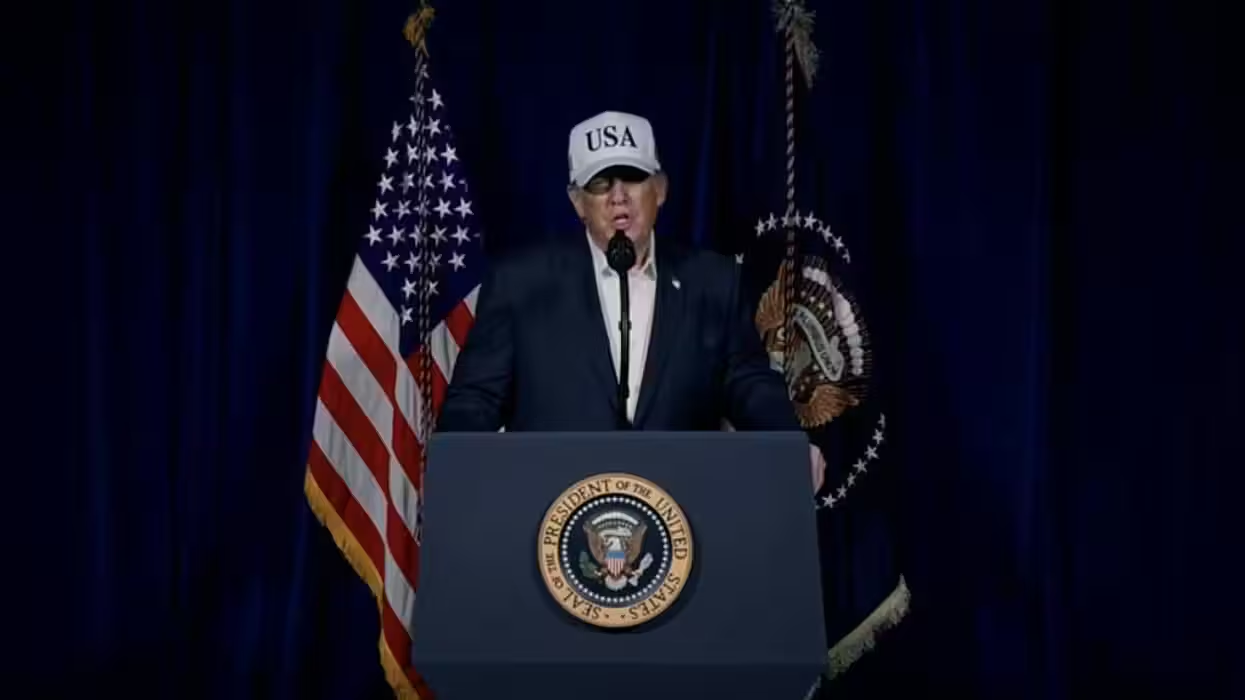
© 2026 Blaze Media LLC. All rights reserved.
The little-known weapon the U.S. used to fight the Soviets during the Cold War
April 07, 2014
A simple but powerful psychological weapon.
Previously at Blaze Books, we examined the role of Soviet strategic subversion and the use of disinformation to undermine the West during the Cold War. But lacking from our discussion has been any sort of a U.S. response, which is the subject of a fascinating new book coming out this summer.
During our interview (key excerpts here) with the highest-ranking Soviet bloc defector of all time, Lt. Gen. Ion Pacepa, in connection his book "Disinformation" (review here), noted that one Soviet disinformation operation was to flood Europe and the Arab world with several millions copies of:
"The Protocols of the Elders of Zion," which along with "portraying the United States as a Zionist instrument used to subjugate the world to Jewish interests played a role in generating the shameful anti-Americanism costumed in the robes of anti-Semitism that we are facing today."
 The Brandenburg Gate behind barbed wire in 1962. The U.S. government understood that the war of ideas was a crucial battlefront if not the most crucial battlefront to win the Cold War. (Image Credit: John Waterman / Fox Photos via Getty Images)
The Brandenburg Gate behind barbed wire in 1962. The U.S. government understood that the war of ideas was a crucial battlefront if not the most crucial battlefront to win the Cold War. (Image Credit: John Waterman / Fox Photos via Getty Images)
However, the U.S., anticipating the economic, military and psychological onslaught that would be leveled at her by the Soviets developed a memorandum themselves to assess such threats and how the U.S. could counter them.
Under "NSC-68: United States Objectives and Programs for National Security," a report published April 14, 1950 for President Truman (highly suggested reading in and of itself), the National Security Council argued that one of our chief weapons against the Soviets was the strength of the American system and its ideals, which could be directed straight at the heart of the Communist system, as the Cold War was at its core a war for freedom against slavery.
To that end, a new title coming out in June covers one such potent psychological weapon: that of the book.
Writing in the Washington Post, in a preview of their forthcoming "The Zhivago Affair: The Kremlin, the CIA, and the Battle Over a Forbidden Book," Peter Finn and Petra Couvée note that in the mind of the Cold War-era Central Intelligence Agency (CIA):
"Books were weapons, and if a work of literature was unavailable or banned in the Soviet Union or Eastern Europe, it could be used as propaganda to challenge the Soviet version of reality. Over the course of the Cold War, as many as 10 million copies of books and magazines were secretly distributed by the agency behind the Iron Curtain as part of a political warfare campaign.In this light, "Doctor Zhivago" was a golden opportunity for the CIA."
Authors Finn and Couvée's soon-to-be-released "The Zhivago Affair," as the title suggests, focus in particular on the CIA's push to flood the Soviet Union with Boris Pasternak's provocative "Doctor Zhivago," the publishing and propagation of which based on their examination of newly declassified CIA documents reflects an amazing and untold battle in the West's ideological war with the Soviet Union.
[instory-book ISBN="9780307908001"]
"Doctor Zhivago's" power to the CIA consisted of both its message and the circumstances under which it was published. As one CIA memo noted:
"Pasternak's humanistic message--that every person is entitled to a private life and deserves respect as a human being, irrespective of the extent of his political loyalty or contribution to the state--poses a fundamental challenge to the Soviet ethic of sacrifice of the individual to the Communist system. There is no call to revolt against the regime in the novel, but the heresy which "Dr. Zhivago" preaches--political passivity-- is fundamental. Pasternak suggests that the small, unimportant people who remain passive to the regime's demand for active participation and emotional involvement in official campaigns are superior to the political "activists" favored by the system. Further, he dares hint that society might function better without these fanatics."
But the book's value lie not only in its anti-Soviet message and "thought-provoking nature," but as noted in another memo:
"also for the circumstances of its publication: we have the opportunity to make Soviet citizens wonder what is wrong with their government, when a fine literary work by the man acknowledged to be the greatest living Russian writer is not even available in his own country in his own language for his own people to read."
As the authors note in their book preview in the Post, these memos comprise two of the:
"more than 130 newly declassified CIA documents that detail the agency’s secret involvement in the printing of “Doctor Zhivago” — an audacious plan that helped deliver the book into the hands of Soviet citizens who later passed it friend to friend, allowing it to circulate in Moscow and other cities in the Eastern Bloc. The book’s publication and, later, the awarding of the Nobel Prize in Literature to Pasternak triggered one of the great cultural storms of the Cold War.Because of the enduring appeal of the novel and a 1965 film based on it, “Doctor Zhivago” remains a landmark work of fiction. Yet few readers know the trials of its birth and how the novel galvanized a world largely divided between the competing ideologies of two superpowers. The CIA’s role — with its publication of a hardcover Russian-language edition printed in the Netherlands and a miniature, paperback edition printed at CIA headquarters — has long been hidden."
"The Zhivago Affair," which tells this remarkable story, is slated for release on June 17.
Want to leave a tip?
We answer to you. Help keep our content free of advertisers and big tech censorship by leaving a tip today.
Want to join the conversation?
Already a subscriber?
Ben Weingarten is a writer, commentator, and editor at large at RealClearInvestigations. He is a senior contributor at the Federalist and writes columns for Newsweek and the Epoch Times.
Ben Weingarten
Ben Weingarten is a writer, commentator, and editor at large at RealClearInvestigations. He is a senior contributor at the Federalist and writes columns for Newsweek and the Epoch Times.
more stories
Sign up for the Blaze newsletter
By signing up, you agree to our Privacy Policy and Terms of Use, and agree to receive content that may sometimes include advertisements. You may opt out at any time.
Related Content
© 2026 Blaze Media LLC. All rights reserved.
Get the stories that matter most delivered directly to your inbox.
By signing up, you agree to our Privacy Policy and Terms of Use, and agree to receive content that may sometimes include advertisements. You may opt out at any time.






